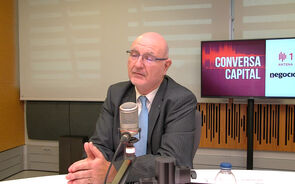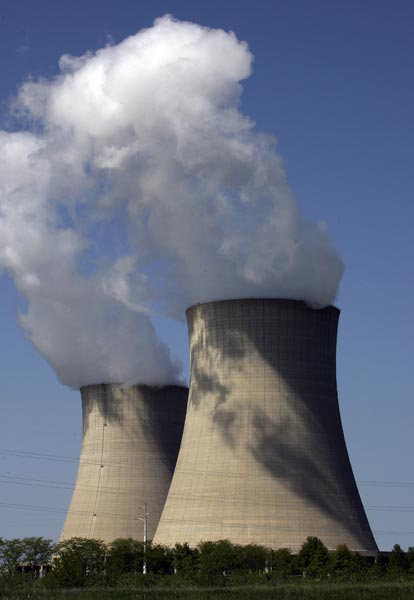Energia Nuclear
E será que não acarreta os mesmos perigos, caso haja um eventual desastre, para a saúde pública como um reactor comercial?
Sou totalmente a favor da construção de uma ou várias centrais em Portugal. Não nos podemos esquecer que Portugal tem um sub solo relativamente rico em "metais industriais" nomeadamente em urânio. Logo uma mais valia para fazer diminuir o tal custo de inicio de exploração ao mesmo tempo que favoreceria as trocas comerciais inter-regiões.
Daqui a 100 ou 200 anos já deverá haver solução para os resíduos nucleares ou até mesmo outra fonte de energia mais rentável.
Sou totalmente a favor da construção de uma ou várias centrais em Portugal. Não nos podemos esquecer que Portugal tem um sub solo relativamente rico em "metais industriais" nomeadamente em urânio. Logo uma mais valia para fazer diminuir o tal custo de inicio de exploração ao mesmo tempo que favoreceria as trocas comerciais inter-regiões.
Daqui a 100 ou 200 anos já deverá haver solução para os resíduos nucleares ou até mesmo outra fonte de energia mais rentável.
- Mensagens: 50
- Registado: 28/8/2007 20:28
JeRoK Escreveu:Boas!Broker_Invest Escreveu:Nos temos uma Central Nucelar de testes no rio tejo quem vai A23 sentido Guarda, Vêm que as chaminês são iguais aos desta imagem. ´só como eu digo é uma central de testes.
Por acaso não se estão a referir à Central Termoeléctrica de Abrantes? Penso que não é uma Central Nuclear...
Cumps,
existe um reactor no ITN, localizado na Estrada Nacional 10, SACAVÉM
Boas!
Por acaso não se estão a referir à Central Termoeléctrica de Abrantes? Penso que não é uma Central Nuclear...
Cumps,
Broker_Invest Escreveu:Nos temos uma Central Nucelar de testes no rio tejo quem vai A23 sentido Guarda, Vêm que as chaminês são iguais aos desta imagem. ´só como eu digo é uma central de testes.
Por acaso não se estão a referir à Central Termoeléctrica de Abrantes? Penso que não é uma Central Nuclear...
Cumps,
"The simplest answer is usually the correct one."
- Mensagens: 47
- Registado: 28/6/2006 0:00
Broker_Invest Escreveu:Nos temos uma Central Nucelar de testes no rio tejo quem vai A23 sentido Guarda, Vêm que as chaminês são iguais aos desta imagem. ´só como eu digo é uma central de testes.
é um reactor para investigação
ITN - Instituto Tecnológico e Nuclear
http://www.itn.pt
According to Ipsos MORI, a polling outfit, public support for nuclear energy has risen over the past six years (see chart). More Britons now support nuclear power than oppose it. But despite official arguments about nuclear power's low-carbon nature and potential contribution to more secure electricity supplies, the rise in its popularity has hardly been dramatic. Support peaked in 2005 and has fallen since then, except among MPs—many of whom will merely be toeing the line of a government keen to see new plants built.
Experts and pressure groups have tended to worry more in recent years about the cost of building reactors and how to dispose of the waste they generate than about safety risks, says Mr Taylor. But the public has very different priorities. While 55% of respondents cited waste disposal as a problem with nuclear power, 48% worried about a radiation leak and 46% about a nuclear accident. Only 13% cared about the potential cost.
http://www.economist.com/world/britain/ ... id=9954105
The group, which generates a fifth of the UK’s electricity, said “an issue with wire winding” had been discovered at Reactor 1 in Hartlepool during a routine inspection.
The latest problem will delay the restart of production at the reactor and British Energy said two more units would have to be taken out of service and checked for the same issue. It added that the resumption of production of Heysham’s Reactor 2 would also now have to be delayed.
podemos tb olhar pelo lado positivo e verificar que as inspecções de segurança funcionam e permitem detectar qq anomalia antes que este se transforme um probema grave
a verdade é que a energia nuclear civil no ocidente nas últimas décadas tem um track record de segurança muito positivo
(não considero Chernobyl pq é consenso geral que tal acidente seria altamente improvavel acontecer no ocidente pq houve um total desrespeito pelas regras de segurança)
Tem os seus prós e o seus contras...
From Times OnlineOctober 22, 2007
British Energy shuts reactors on safety fears
Shares in UK nuclear power giant tumble as routine inspection detects problem at one of the group's reactors in HartlepoolSteve Hawkes
Shares in British Energy plunged by nearly 9 per cent in early trading as the beleaguered group revealed fresh safety concerns at one of its ageing nuclear power plants.
The group, which generates a fifth of the UK’s electricity, said “an issue with wire winding” had been discovered at Reactor 1 in Hartlepool during a routine inspection.
The setback comes just two months after Bill Coley, the chief executive, insisted that performance at the group was on an “improving trend”.
The latest problem will delay the restart of production at the reactor and British Energy said two more units would have to be taken out of service and checked for the same issue. It added that the resumption of production of Heysham’s Reactor 2 would also now have to be delayed.
Related Links
British Energy favours South for reactors
Government to raise £2.2bn from British Energy
Nuclear group seeks private equity cash
In a statement, the group said: “We are currently assessing our return to service dates for these units.
“In determining these dates, British Energy will consider the potential to integrate any additional inspection work arising from our assessment within planned outages over the balance of the year.”
The shares fell 50p to 529p, wiping more than £500 million from the group’s market value and making British Energy the heaviest faller in the FTSE 100.
Despite sky-high electricity prices, British Energy has suffered falling profits because of a spate of production problems since discovering cracked pipes in boilers at Hinkley Point B and Hunterston B a year ago.
In August, the group revealed that underlying profits in the first quarter were down 12 per cent with output 15 per cent below the same period a year ago.
It added that it may not be able to boost production capacity at Hinkley Point and Hunterston to 70 per cent for at least a year because of temperature restrictions.
Um abraço e bons negócios.
Artur Cintra
Artur Cintra
- Mensagens: 3157
- Registado: 17/7/2006 16:09
- Localização: Cascais
Energia Nuclear
Solving "Fission Impossible"
Is nuclear power's comeback for real?
By Daniel Gross
Posted Saturday, Oct. 20, 2007, at 7:04 AM ET
We all know that $30-a-barrel oil isn't coming back, just as we know that simply turning off a few lights won't halt global warming. Yet the search for a low-emission, nonfossil-fuel source of energy has been a bit like American Idol: One after another, fresh-faced alternative-energy-rock-star wannabes are eliminated. Wind and solar are nice and clean—but the sun doesn't work 24/7, and the wind is fickle. Ethanol offers politicians the irresistible combination of grow-your-own energy independence and the potential to make Iowa primary voters rich. But because it's corrosive and soluble in water, it's hard to transport ethanol over long distances through pipelines. And to raise a crop sufficient to meet our gasoline thirst, we'd have to plant the entire continental United States with maize, leaving only a small corner of Delaware for bedrooms and a den.
As contestants are eliminated, it's worth looking at the geezer in the bunch: nuclear power. Last month, nearly 50 years after the Shippingport Atomic Power Station in Pennsylvania became the first commercial power plant to go online, the New Jersey-based utility NRG filed papers seeking permission to build a nuclear power plant in Texas. This represents the first such new application since 1979, nuclear's annus horribilis. Two weeks after the debut of the fear-inducing nuclear-disaster flick The China Syndrome, life imitated art, as the Three Mile Island nuclear plant in Pennsylvania suffered a partial meltdown. That effectively forestalled the creation of new nuclear power plants for a generation. The last reactor to come online was the Watts Bar reactor in Tennessee, in May 1996.
So, what's changed? Twenty-eight years of safe operation (in the United States, at least) have helped pave the way for NRG and for a couple of dozen other possible plants in the works. Indeed, even as they're mocked in popular culture—see The Simpsons—the nation's 104 commercial nuclear-generating units have been quietly humming along without significant incident. "The Bureau of Labor Statistics will tell you that the nuclear industry is the safest place to work—safer than real estate and Wall Street," says former New Jersey Gov. Christine Todd Whitman. (You remember her—she played the environmentalist in the first Bush term.) Through the first half of this year, nukes provided 19.8 percent of U.S. electricity generation, about the same proportion as they did in 1990.
More important, thanks to developments in the broader environment, many longtime critics are changing their tune. As a co-founder of Greenpeace, Patrick Moore used to call nuclear energy "synonymous with nuclear holocaust." But he now believes "nuclear is the cleanest, safest and has the smallest footprint" of any major energy alternative source. He says that nukes are cheap and reliable, unlike alternative-energy sources such as wind and solar. Neither do nuclear plants spew sulfur dioxide into the atmosphere, as coal-powered plants do, or create massive volumes of CO2 emissions, as gas-fired plants do. The attitude of Moore, who co-chairs the Clean and Safe Energy Coalition, an industry-backed supporter of nuclear energy, is virtually indistinguishable from that of David Crane, chief executive officer of NRG: "Advanced nuclear technology is the only currently viable large-scale alternative to traditional coal-fueled generation to produce none of the traditional air emissions—and most importantly in this age of climate change—no carbon dioxide or other greenhouse gases."
Another megatrend is working in nuclear's favor: demographics. In 2006, an estimated 41.3 percent of the population was under 30. Which is to say that the percentage and number of Americans who remember the accidents at Three Mile Island and Chernobyl decline with every passing year.
To be sure—in any article dealing with alternative energy, there's always a "to be sure" section—nuclear power has some serious problems. It takes a lot of money, and a lot of time, to add new capacity. NRG says that if all goes well, its new nuclear units, which could power 2 million homes, may come online in 2014 and 2015. And investors aren't eager to commit billions of dollars to controversial long-term projects that might never get built. The government is trying to help by providing risk insurance and streamlining the approval process.
There's also still the huge problem of where to put the waste. But as Rudy Giuliani suggested recently, if a bunch of European socialists can figure out what to do with the radioactive leftovers, why can't we? "France is ahead of us in nuclear power," he said recently, with the same sort of disgust he might use in reporting that the Red Sox were ahead of his beloved Yankees. "Eighty percent of the electricity in France comes from nuclear power."
But when it comes to reaching a definitive solution on how to deal with nuclear waste, our vieux allies are stuck in the same quandary as we are. For years, Congress has been debating a proposal to store nuclear waste in Nevada's Yucca Mountain. In France, where plans to bury waste in rural areas raised similar hackles, the response has been to change the conversation. France has developed a program to store waste temporarily, while researchers figure out what to do with it. It's hardly an elegant solution. Which explains why nuclear energy, which has been the energy of the future for the last 50 years, may continue to be so.
This article also appears in the Oct. 29 issue of Newsweek.
Daniel Gross is the Moneybox columnist for Slate and the business columnist for Newsweek. You can e-mail him at moneybox@slate.com. He is the author of Pop! Why Bubbles Are Great for the Economy.
Article URL: http://www.slate.com/id/2176189/
Quem está ligado:
Utilizadores a ver este Fórum: Bing [Bot], Phil2014 e 326 visitantes




